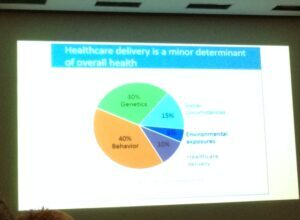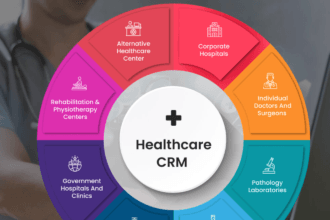It was evident from this year’s Consumer Electronics Show (CES) earlier this month that there’s a great deal of interest in the Internet of Things (IoT) in general and for Health IoT in particular. Given that interest I thought I would reach out to a couple of experts to help explore the IoT landscape. Murali Kurukunda is Director of IT and Lead Architect at Medecision and Dr. Peter L.
It was evident from this year’s Consumer Electronics Show (CES) earlier this month that there’s a great deal of interest in the Internet of Things (IoT) in general and for Health IoT in particular. Given that interest I thought I would reach out to a couple of experts to help explore the IoT landscape. Murali Kurukunda is Director of IT and Lead Architect at Medecision and Dr. Peter L. Levin, is CEO at Amida, director of ConversaHealth, and a father of the BlueButton initiative (which he helped launch as CTO of VA). Murali and Peter (along with Medecision and Amida) are right in the middle of intersection of data, interoperability, hardware, software and services for IoT in healthcare; they were kind enough to share with me what they’re seeing as the major opportunities in the space. Here’s what they think, in their own words:
Connecting smart biological sensors to the internet is not a new idea. There are already dozens of products in the market that continuously monitor blood glucose and heart function, for example, and enable secure remote management for clinicians and caretakers. The safety of life implications are enormous, and the commercial opportunities untold. Some analysts predict a $100 billion-plus market for the healthcare segment of the “internet of things” (IoT).
What is new and emerging is the physical scale of the devices on the one hand, and the need to aggregate, reconcile, and consolidate those data streams for downstream clinical care services. Advances in semiconductor device manufacturing will relentlessly drive down the price and the size of these electro-physiological sensors, literally to nanometer scale, which will ultimately be able to do more than detect, they will be able to intervene. At the same time, our ability to make sense of the torrents of information is catching up to our ability to create them.
We believe that these are tremendous opportunities for public health and software companies like ours. It is why we are investing so much of our own resources to promote the open design, secure exchange, and value-added analysis of health data systems. Perhaps the largest inhibitor to a promising future of longer, healthier, less expensive life are the software merchants and device manufacturers who still and astonishingly insist on keeping data closed, isolated, and trapped in proprietary systems. We believe this is about to change, too.
The interoperability troubles with electronic medical records are legion, and we won’t waste our pagespace or your attention lamenting the deeply ignorant and the nearly criminal. The immortal words of Forrest Gump’s assessment about doing dumb things finds purchase here.
What we can do, however, is find clever ways leverage of IoT as yet-another, and maybe decisive, fulcrum of connected care. For what is today true in isolation – progressive plans, concerned parents, engaged patients – will soon-enough be more the ubiquitous standard of coordinated care; that coordination will reach deeply into pocketbooks as well as bodies.
We know that there are legitimate concerns about individual privacy and device safety, and that some people would literally rather die than compromise on either. We respect that, even as we actively promote more automation and digital services in health care.
Some of us believe that the existential benefits of independence and longevity outweigh the potential risks of intrusion and malfunction, some of us don’t. The point is that everyone should have the choice, and that no one should be coerced or manipulated into choosing one side of the argument. Fear mongering (about privacy) and fabrication (about intrusion) are forms of manipulation. In the case of health care they cost lives and money.
Let’s, instead, imagine a world of seamless, secure, and reliable health data interoperability. Let’s find a better way to safely liberate data at its source – labs, pharmacies, hospital and clinics, insurance claims, as well as implantable and wearable devices – pass it through hygienically sealed pipes, and receive it in places where it does the most good. That may be during a clinical care or remote telemedical encounter (to give you the best possible advice based on evidence and your personal health history), it may be when you pick up your medicines (to check for interactions with other medicines), or it may be to help your insurance company help you (because they have always had a bird’s eye view of your services, and they can’t kick you out for pre-existing conditions anymore).
Because of changes in the law, it may be with a loved one or trusted caretaker. It may be you.
The data could be as simple as a reminder message about an upcoming appointment, a warning message that a clinical value seems out of range, or an answer to a securely-texted question to your doctor. We have imagined that future and it is, as Ray Kurzweil likes to say, near.
There are two challenges, and they are slowly receding.
The first is that the data holders are still reluctant to share, even though it isn’t “their” data. This will become less of a problem, as forward-looking providers like VA and DoD have shown, as well as payers like CMS, Aetna, and HCSC among many others have demonstrated. All are outspoken supporters of the Blue Button program, now in its fifth year, and still growing.
The second falls squarely on our shoulders: we need to make the user experience attractive, convenient, and useufl. The health IT community has made terrific strides recently – we-two have worked on the InCircle and a soon-to-be announced medication management app, for example – and there are many companies that target data-driven patient-provider interactions, including AmericanWell and ConversaHealth.
The beautiful thing is that IoT fits so neatly into this conversation. The goal, of course, is to help us achieve our best-possible health. The best way to do this is with data. And the best data is coming at us in ever more granular packages, from patient-hosted sensors that monitor, detect, interact, and intervene. Weaving those into the tapestry of your personal health history is the next vanguard of coordinated and managed care.
The post Health IoT creates huge opportunities for public health and software companies appeared first on The Healthcare IT Guy & Digital Health Nexus.









